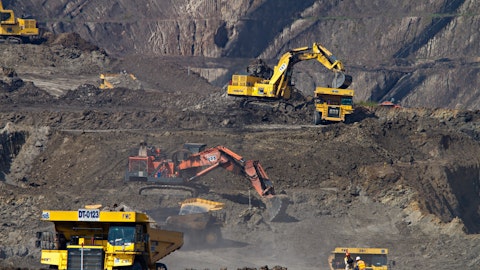Michael Samuels: Okay. And then last question…
Mark LaVerghetta: If I can add in on…
Michael Samuels: Go ahead.
Mark LaVerghetta: If I can add in on that, too. It’s – each separate entity. We would capitalize American Carbon differently than we would American, excuse me, ReElement Technologies. Those things would look differently just given the markets that they operate in and the opportunities that they have in front of them. They probably also carry a different multiple in the public market as well. Hence, the reason to drive forward with that unbundling of assets to extract that value. We think both of them carry different multiples, as well. So capital allocation for growth, multiples in the public marketplace, and then separating it from an operational and governance perspective as well makes a lot of sense to do so. And then where American Resources would sit post that potential split or divestiture of any of the carbon assets, American Resources would continue to leverage the ReElement refining, just given that strategic advantage of refining critical minerals to be able to broaden the natural resource play.
Again, march over in Africa, we’re looking at a variety of different lithium plays. Again, because we can refine lithium very cost effectively into high purity forms. It’s a hard element to refine.
Michael Samuels: Will you be able to get enough batteries?
Mark LaVerghetta: Well, that’s the unique thing. The opportunities we’re exploring right now are for spodumene, which are – which is natural occurring ore, right, just like coal, just like iron ore or any other mine-based product, that is again, strategically differentiates us because it helps us bridge that gap of when are all these batteries going to become to an end of life? Is it going to be five years from now, 10 years from now, 15 years from now? The recycling market is dependent on end of life or manufacturing scrap. But like I said earlier, nobody is producing a whole lot of things here in the United States yet. Mandate has been set, the capital is being deployed, infrastructure is being stood up, but manufacturing scrap isn’t widely available in large volumes today.
Getting our hands and access on high-quality ores in the lithium market is very attractive for us. That helps us bridge that gap to when recycling takes on a much larger products mix or input mix of your feedstock.
Michael Samuels: Okay. And then last question. It’s been a while now since we applied for the ReElement side. And I know you had questions back from the SEC and I thought you answered them. So how far along are we on the spin-off of ReElement right now?
Mark LaVerghetta: Oh, time is relative. Mike, I think the reason why we announced it initially was from a strategic perspective because having a really clean tech refining company embedded inside of a coal mining company, just called spade to spade. There’s some strategic advantages for us doing that. Some portfolio managers aren’t allowed to buy. They want a piece of ReElement, but they can’t buy it within American Resources. But announcing that we have a planned spin-off, maybe it gives portfolio managers. And there’s some other strategies that, that makes a whole lot of sense of from other aspects within the supply chain in developing commercial partnerships and looking at different, government-based incentives or grants opportunities as well. So there’s a reason why we announced it maybe early in the process because we wanted to be on record of this is our plan.
Michael Samuels: [But the clearance] if we wanted to go forward.
Mark LaVerghetta: Kirk, you want to….



